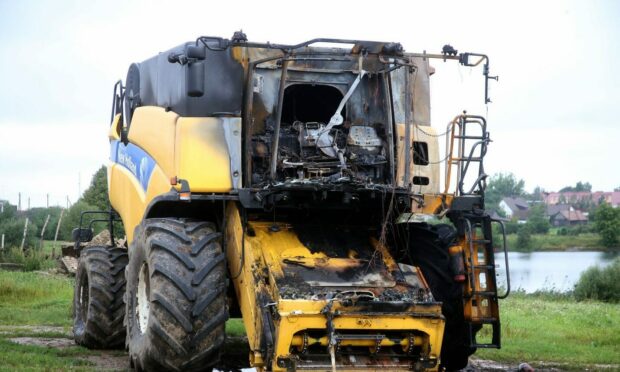Farmers are being urged to carry out extra safety checks this harvest as July’s soaring temperatures bring an increased risk of combine fires.
Rural insurer NFU mutual has published a fire prevention checklist to help farmers reduce the risk of costly machinery and crop fires during the hot, dry weather.
It is also offering premium discounts to farmers who fit approved fire suppression systems to their combines after it saw a 35% increase in the number of combine fire claims during last year’s harvest.
The insurer said the combination of dust, hot moving parts, electrical wiring and diesel provides the ideal ingredients for a major crop or machinery fire.
To limit the risk, it suggests regularly cleaning out dust and chaff from hot spots and checking the machine over once work is finished for the day.
Other advice includes having a plan in place in the event of a fire, including a system for keeping in contact with lone workers and those living on the farm, and using the What3Words App to help emergency services identify precise locations when help is needed.
It also recommends keeping a fire extinguisher on the combine and a bowser filled with water on hand, and being prepared to create a fire break in the event of a crop fire.
NFU Mutual Risk Management Service’s Evita van Gestel said combine fires can spread quickly in hot, dry weather, causing significant damage to crops and disrupting farms at a busy time of year.
“Working long hours in dusty conditions means regular cleaning and maintenance is essential to reduce the risk of a fire,” she said.
“Combine fires put lives at risk, can spread into crops and threaten surrounding buildings, so this is about far more than the loss of a machine and disruption at the busiest time of year.
“And with new machines costing over £250,000, scrupulous attention to cleaning and fitting a fire suppression’s system is a no-brainer.”
Tips to prevent a combine fire this harvest:
- Have a plan in place in the event of a fire, including a system for keeping in contact with lone workers.
- Keep a phone with you at all times — not just in the cab
- Always stop to investigate hot-running engines or bearings
- Make sure drivers are aware of power line locations and check they can pass safely under wires
- Fit a suppression’s system that meets P-mark status to contain, extinguish and prevent fire.

Conversation